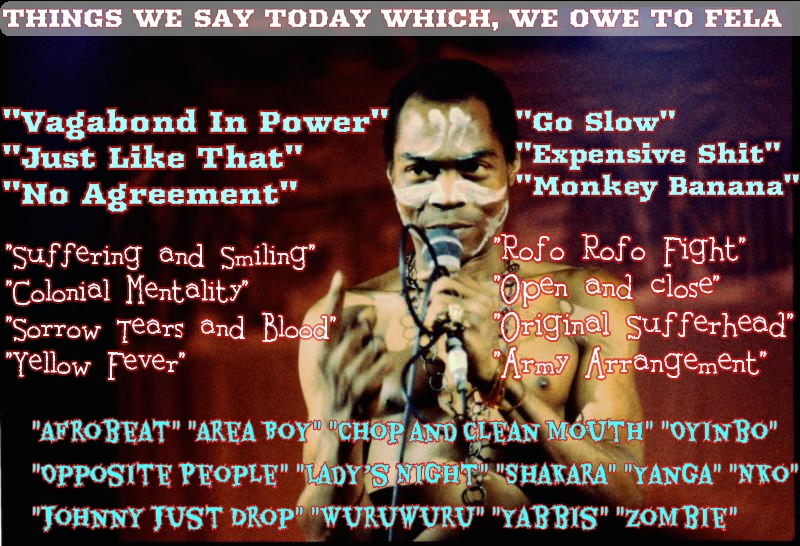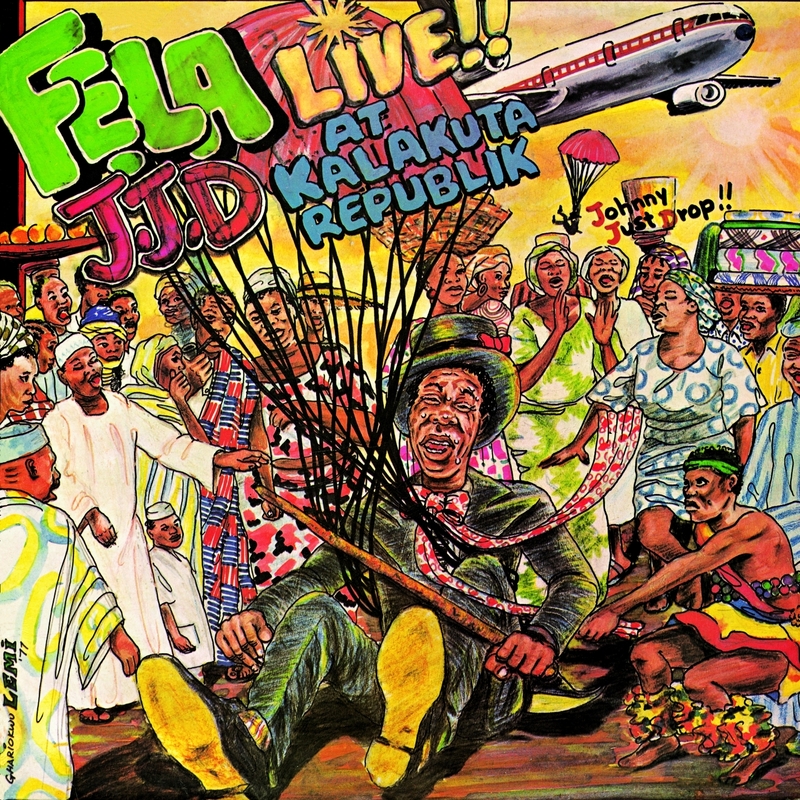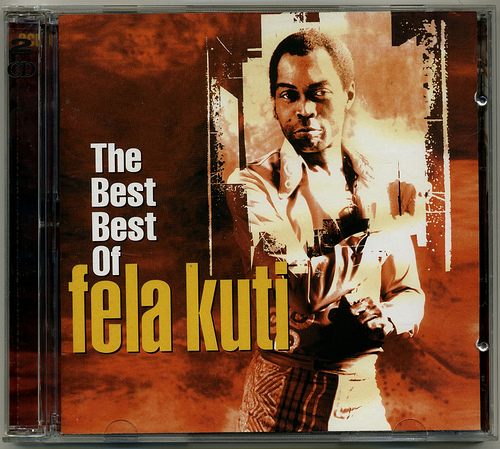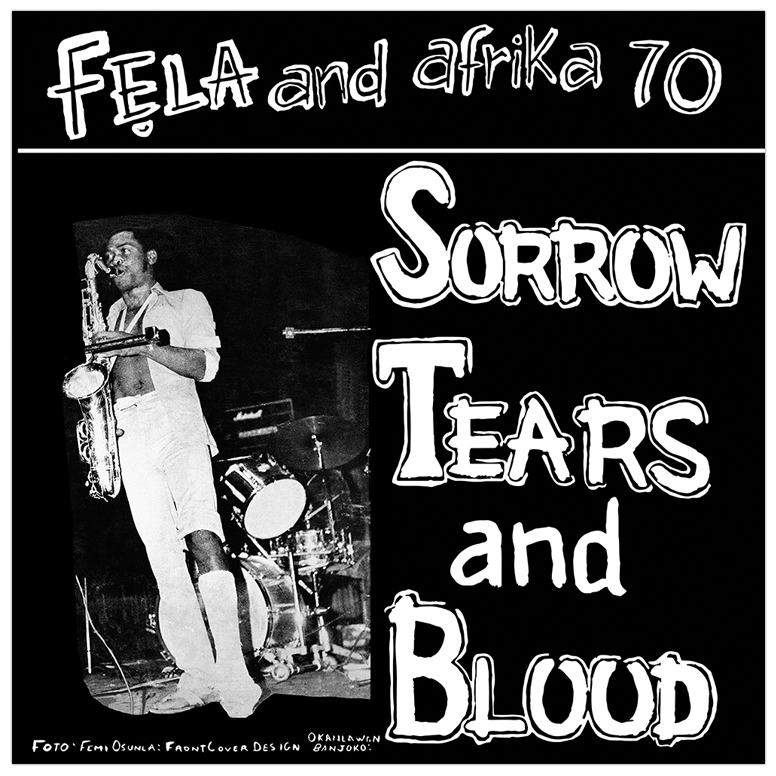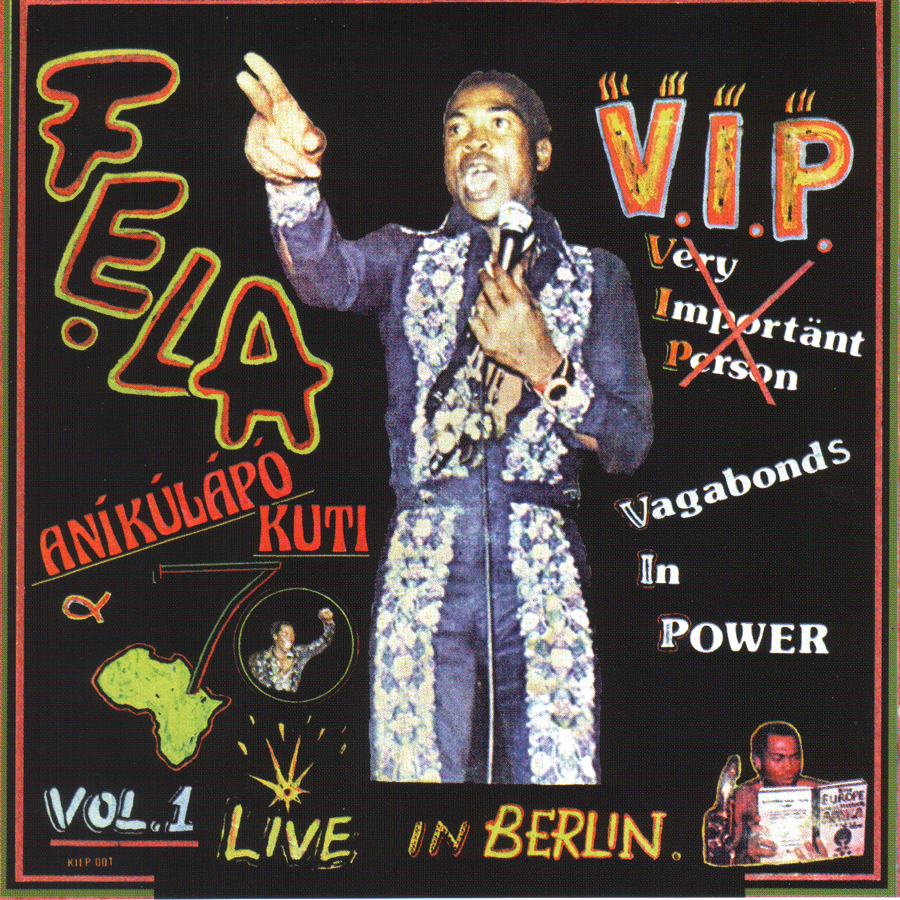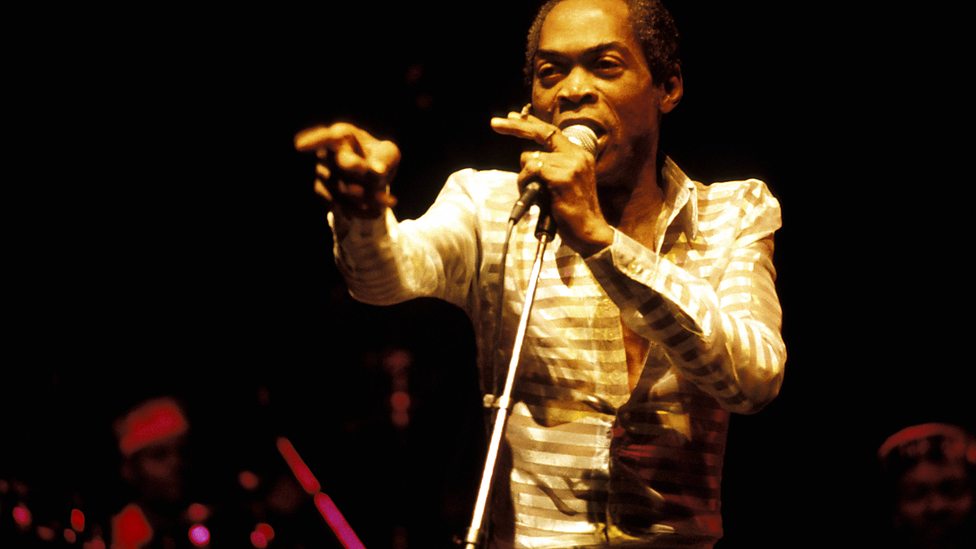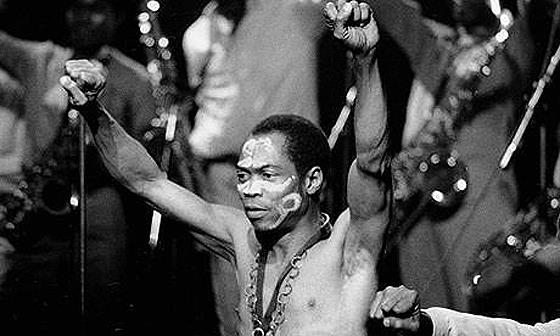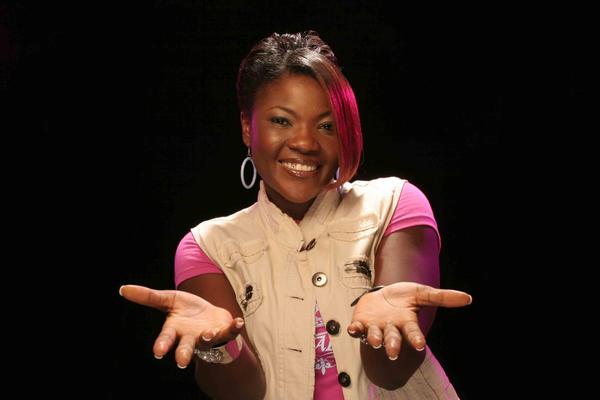The Bard, William Shakespeare, gave us words like “seen better days”, “love is blind”, “a sorry sight”, “good riddance”, “faint hearted”.
Obviously not a faint hearted fella, Fela Anikulapo-Kuti on his part coined, rejigged, and rephrased words to suit his biddings.
For Johnny-come-lately – someone who has recently joined a group or activity and does not know much about it – the Abami Eda calls such a person Johnny Just Drop, JJD!
So, we delve into our archives, as well as his pool of songs, to come up with what you can call Felanguage – things we say today, we “owe” to the King of Afrobeat!
Advertisement
It is not an endless list because we have deliberately omitted some words that will require censorship – like his version and meaning of condom to mention but one!
Shakara: Shakara Oloje is posturing or feigning an offensive mood. According to Fela, the word was “a Mushin word but it was not popular…I made it popular through my records. …When I want to write lyrics, I think about my environment, I think about catchy words, words that can easily be identified with society”.
Yellow Fever: This 1976 track was a Mushin word like Shakara. “It was the people of Mushin who first called traffic wardens Yellow Fever,” Fela is quoted by Michael Veal in his book The Life and Times of an African Musical Icon. “So I decided to call the skin bleaching people Yellow Fever.” And that’s what they are still called to date.
Advertisement
Felagoro: The uninitiated wouldn’t know this brew of boiled marijuana leaves mixed with sodium but this home-made alcoholic drink “processed” at Kalakuta Republic and sold at the Africa Shrine and environs rivalled the products from Nigeria Breweries and co.
JJD: Acronym for “Johnny Just Drop” is an example of someone who doesn’t know the drink Felagoro! A JJD is a newcomer with unpractised steps and fake swagger who is easily exposed by his overzealousness and the need to “belong” at all costs.
Africa Shrine: Fela’s place of worship and nightspot predates the New Africa Shrine owned by his son Femi Kuti and the Orkija Shrine owned by… (fill in the gap!).
Advertisement
Kala–kusa: The “cell” where an erring member of the Kalakuta Republic is kept.
Area Boy: Fela and his commune not only had skirmishes with the police and army but with neighbourhood gangs, the boys in the area, or to Yorubanise it, Area Boys! The term was used by residents of Kalakuta Republic to make a distinction between them and the rascally group outside the commune.
Chop and Clean Mouth: These days, smart politicians and those adept in the act of cooking the books and getting away with it are said to have “Chop and Clean Mouth” as if nothing happen! It is the title of one of his unreleased songs.
Kurukere: Baba Fryo and later Inyanya popularised this word in their hit tracks but it’s a common word from the mouth of the Abami Eda. It denotes insidious moves from someone trying to outsmart another whether in the office, at home, in the church, in a queue, etc.
Advertisement
Egypt ‘80: From Highlife Rakers, Koola Lobitos, Nigerian ’70, African ’70, to Egypt ’80 the name of Fela’s band evolved down the years. But the last name – Egypt ’80 – is higher on our subconscious. And it will be hard for you to not remember the band once you come across the country Egypt. Even while reading your Bible!
Opposite People: It’s the title of one his tracks released in 1975. OP are people considered reactionary or anti-progress. Like kurukeres, they are found everywhere even in places of worship!
Advertisement
Afrobeat: Though he later denounced the word as “a meaningless commercial nonsense with which recording labels exploited the artist”, the nomenclature came about because of his music. And even his later day distaste for the word will not change that.
Advertisement
Colonial Mentality: An African who has internalised Western culture, manners, tastes, and traditions is considered to be suffering from Colonial Mentality or what Fela calls Colomentality in his 1976 track.
Sunday Jump: The name of his shows on, erm, Sundays where he occasionally performed with other musicians. It remains a common practice in the industry.
Advertisement
Kalakuta Republic: This may well be the mother of all words associated with Fela. His communal residence from Kalakuta I, on 14A Agege Motor Road to Kalakuta II, on 1 Atinuke Olabanji Street, Ikeja to Kalakuta III, on 7 Gbemisola Street, Ikeja accommodates “every African escaping persecution”.
Lady’s Night: Tuesday shows when females could enter without a fee even those disguised as one! It has caught on with some current musicians.
NNG: This acronym stands for Nigerian Natural Grass aka marijuana. It got a mention in one his tracks Give Me Shit, I Give You Shit when he sang: “The rest NNG wey dey inside my pocket I dash, e happy, e start to talk…” So, if someone asks you: “Care for NNG?” You know what it means and where he got the acronym from.
Alagbon: Before Fela had brushes with the authorities, Alagbon Close was probably known to the police and criminals who “patronised” the place. But the street where the Criminal Investigation Department is located entered our vocabulary when it became the title track of one of his albums Alagbon Close.
Yanga: The word for trying to appear modern or cultured was made popular in the 1972 track Trouble Sleep Yanga Go Wake Am (popularly known as “Palaver”). This song and all the words associated with it remains very popular in Nigeria today, having lost none of its relevance.
Zombie: More on this word can be found in an earlier article on the Abami Eda. But if you are too lazy to click and read the hyperlink, Zombie is the name given to a soldier who “obey before complain” and follows “orders from above” blindly.
Oyinbo: Oyinbo man or white man is a Caucasian or any persons with light pigmentation even a Chinese! The word was used to good effect in the 1975 track Mr Grammartologylisationalism Is the Boss.
Wuruwuru: A shady deal from Kurukere and non-Kurukere people. The word found expression in the hit track Re Re Run.
Yabbis: Fela’s world revolved around Yabbis. From light-hearted banter to crude “below the belt” jibes, it was a currency “spent” in Kalakuta Republic. And it even had its own commandment: “Yabbis no case, first touch na offence.”
Nko: This word, with different meanings, made a bold appearance in Confusion Break Bones. Nko could mean “What?” Nko could mean “and so what?” Nko could mean “what about you?” It reminds us of former president Olusegun Obasanjo when he asked a student: “You nko?” when he wanted to know his choice of career!
Look and Laugh: His song with the same words is a litany of his confrontations with the Nigerian authorities and his decision to now be “looking and laughing” after all else has failed in provoking a change. It’s the same thing a popular “Sidon look” Yoruba politician did in time past. Currently, some members of the Peoples Democratic Party are now “looking and laughing”!
Sorrow, Tears and Blood: This song offers a poignant but direct recounting of the February 18, 1977 siege on Kalakuta Republic. Now, newspaper headlines or opening paragraphs of any incident that leads to loss of lives and properties reads “sorrow, tears, and blood”. Its acronym STB is now often used to describe an amorous relationship between a boss and subordinate in the office. Spelling it out, though, may require censorship. But it’s obviously not Sorrow, Tears, and Blood even though sometimes that other STB leaves sorrow, tears, and blood in its wake!
Power Show: This 1982 track is a humorous observation of abuse of power which still occurs at every facet of our lives. And like he sang: “Power show na bad thing, na sad thing, na wrong show ooo!”
Original Sufferhead: Someone that’s going through severe hardship could be said to be experiencing Original Sufferhead like the Fela’s song which paints a state of deprivation.
Shuffering and Shmiling: But in this state of deprivation, some are unaware of their plight and continue to suffer in oblivion – “49 sitting 99 standing…dem go pack themselves like sardine…”
Roforofo Fight: Any fight that goes messy like in the national assembly (over power and money) or in the home (over money and power) is a Roforofo Fight like his 1972 track. And it’s a favourite caption of newspaper editors second only to STB – Sorrow, Tears, and Blood.
Army Arrangement: The track released in 1985 discusses the Nigerian presidential elections of 1979, widely dismissed as fraudulent; an imposition of a candidate by the army who organised (arranged) the electoral process. Replace 1979 with 1999 and “one answer you go get ti – army arrangement!”
Just Like That: The track paints a “graphic description of class conflict, economic decline, corruption, and ethically inflicted backroom political infighting”. But the words are more or less used now as an exclamation mark! For example:
A: Fifty billion naira disappeared from the state coffers.
B: Just like that!
Vagabond In Power: Tejumola Olaniyan in his book Arrest The Music calls this 1979 track “a patient explanation of what disqualifies African leaders from being regarded as Very Important Persons and why they really are Vagabonds In Power.” Some of them are still VIPs though only that it’s the unsavoury version.
No Agreement: This 1977 track is a formal public declaration of Fela’s uncompromising stance against injustice and tyranny. Editors now use this term, as well as another of his track Stalemate, to show when there’s a deadlock over an issue of personal interest couched as a national interest.
Go Slow: The Englishman calls it “traffic jam” but we prefer to call a long line of vehicles on a road that cannot move or that can only move very slowly “Go Slow” – the Fela’s 1972 song which satirise the infrastructural chaos of modern Nigeria.
Mr Follow Follow: Released in 1976, the track lampoons the lack of imagination of the Nigerian middle class. And it warns: “…if you dey follow follow dem route, na inside gutter you go quench…” And it’s worth reminding you what you will find in there: “…cockroach dey, rat dey, iko dey, darkness dey…” So, stop doing “follow follow” with that your… You know who or what you are obsessed with!
He Miss Road: This 1975 song is one of the few tracks that did not tackle pressing social issues. Rather it’s a comical rendition of the misfortune inherent in a confused or mistaken plan. “He don miss road” is what is said about such a person nowadays!
Add a comment
